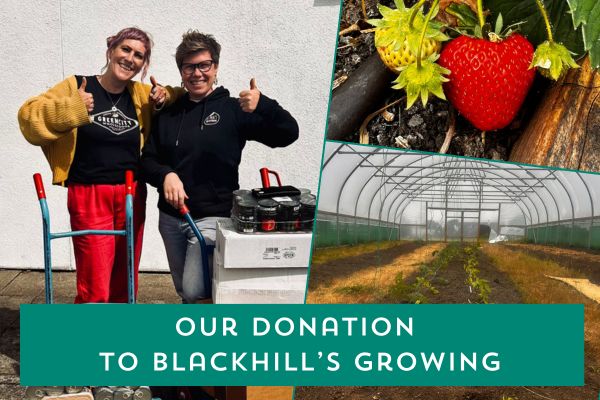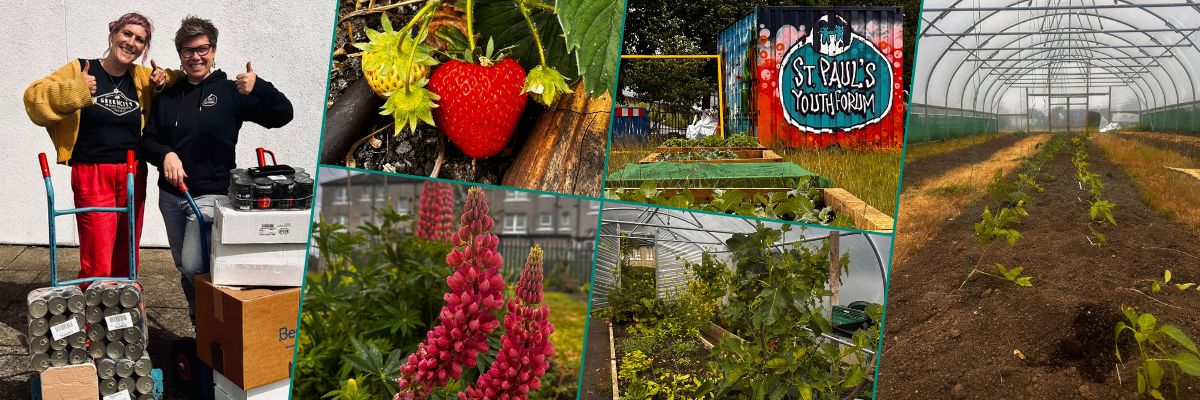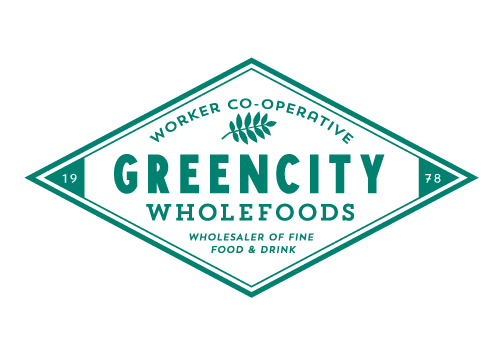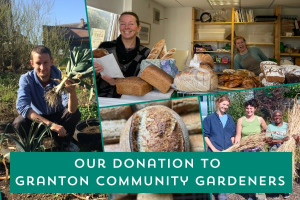
The good people at Blackhill's Growing reached out to us with the hope of becoming recipients of our monthly £500 donation.
After a quick discussion our donations team agree that they're definitely worthy! I was lucky enough to be able to do the donation myself which allowed me to have a look around the three sites up there at Blackhill. I even got to cuddle some of their beautiful chickens.
I came away not only impressed with all the hard work they've done but totally inspired to get growing in my own little patch of land! Watch this space.
Sasha from Blackhills answered a few questions for us to explain a bit more about what they do. Over to you, Sasha...

1.Tell us about how it all started at Blackhill Growing.
In 1997 St Paul’s Youth Forum (SPYF), our umbrella organisation was formed around grass roots youth work. Initially a small project it grew over the following years and, inspired by an exchange trip to Zambia in 2005, the young people decided to start keeping chickens, plant a fruit orchard and start growing vegetables. The garden itself was started in 2015.
Blackhills Growing grew out of a local interest in growing food locally by a group of locals and youth workers, as a way to increase access to locally grown healthy fruit and veg, which was sadly in short supply in the local area. The team has been growing ever since. We now deliver a weekly food pantry, community meal, our ever popular veg barra - where we purchase wholesale fruit and veg to sell in the local community - as there is nowhere locally to buy good quality affordable fruit and veg. In addition to this we have our community garden which houses three poly-tunnels, multiple outdoor raised beds for food growing, as well as some beautiful ornamental borders to attract the pollinators. Our fabulous chickens are always keen to entertain visitors, when local people come and say hello to them. The hens give us plenty of free range eggs which are available by donation for the local community.
The big project at the moment is getting ‘Blackhill Community Farm’ up and running, which you can hear about later on. This will be a space for the community to enjoy being outdoors, engage with nature, and learn about growing food. We will work with local schools and other groups from this space to support the health and wellbeing of the local community.
We plan to develop learning and training opportunities as well as creating a route to market with some of our produce to supply local businesses.
2. Can you tell us a little bit about what will be done with the food donation provided by Greencity?
The Greencity donation will provide essential stock for our Community Pantry. The Pondy Pantry is open one afternoon a week and provides a dignified way for people who may be experiencing food poverty to access food in their local community which is affordable and nutritious.
The Pantry is stocked via various sources with surplus food and members pay a small fee to shop each visit. The Greencity donation will provide much needed stock of ambient food, which is an essential aspect of the shop. The pantry is open to all without referral and is widely used to access good quality food.
3. What other interesting things are going on at Blackhill Growing?
Blackhill Community Farm is our very exciting new-ish project. We rent the land via the Vacant and Derelict Land Fund through Glasgow City Council, and we started developing it in 2024. We are working hard to develop it into a beautiful and productive green space, for local people to access in a way that suits them. That could be simply to sit and enjoy the plants, or to learn about growing via the volunteer sessions and pitch in with the work.
We have many hopes and aspirations for the space and are in close conversation with the community all the time about how they would like to use the land. There will of course be a strong focus on food production, and we are looking at various routes for this food to be channeled, both inside and outside of the local community. Whatever route it takes we will always ensure that the community benefits either directly or indirectly.
4.Tell us a bit more about any other things you do to support the local community.
The Blackhill’s Growing Team are focused on tackling the worst effects of poverty through growing, cooking and eating good food. Whether that is through the weekly community meal, the community pantry, the veg barra or the growing spaces. We work closely with local schools and the family learning centres to help the children learn about growing and eating food. Our growing spaces are open for anyone to come in and spend time in, and we aim to be as open and welcoming to everyone.
5. Is there anything members of the public can do to help support your organisation?
We are always looking for new volunteers, if you are interested in food growing or keen to learn we welcome you along to either of our growing sessions. If you want to get involved at the start of a new and exciting community farm project, do get in contact or just come along to a session.
Sessions are every Tuesday 2-4:30 at Blackhill Community Farm - which you can find with a quick Google search.
Alternatively if you would like to be involved in a more established growing space then we hold growing sessions on a Thursday afternoon 12.30 - 3pm in the community garden at St Paul’s Parish Church on Langdale Street. Anyone over 16 can come along to these sessions, we will provide everything you might need.
As a charity we are reliant on grant funding and are keen to establish some formal corporate partnerships, so if this is something that your organisation is interested in then please get in touch.
6.If you could invite 6 people, living or dead, to one of your community meals who would you invite and why?
Ohhh, what an interesting question!
Cathy McCormack would be one, she was a community housing activist from Easterhouse who did amazing work.
Mary Barbour, she was again an activist who fought poverty by building working class power.
Raj Patel who wrote Inflamed, and Stuffed and Starved, he would be a very interesting person to talk to about food and structural poverty.
Dee Woods From LION, Land In Our Names, an organising group working on securing land rights for BME britons.
Robin Wall Kimmerer who wrote the very beautiful book Braiding Sweetgrass about connection to nature.
James Rebanks who wrote English Pastoral, he would be great to talk to about the history and politics of food and farming.
Thanks to Sasha for answering our questions and to Catherine for the guided tour and photos!
You can find out more about Blackhills Growing on instagram @blackhills_growing






